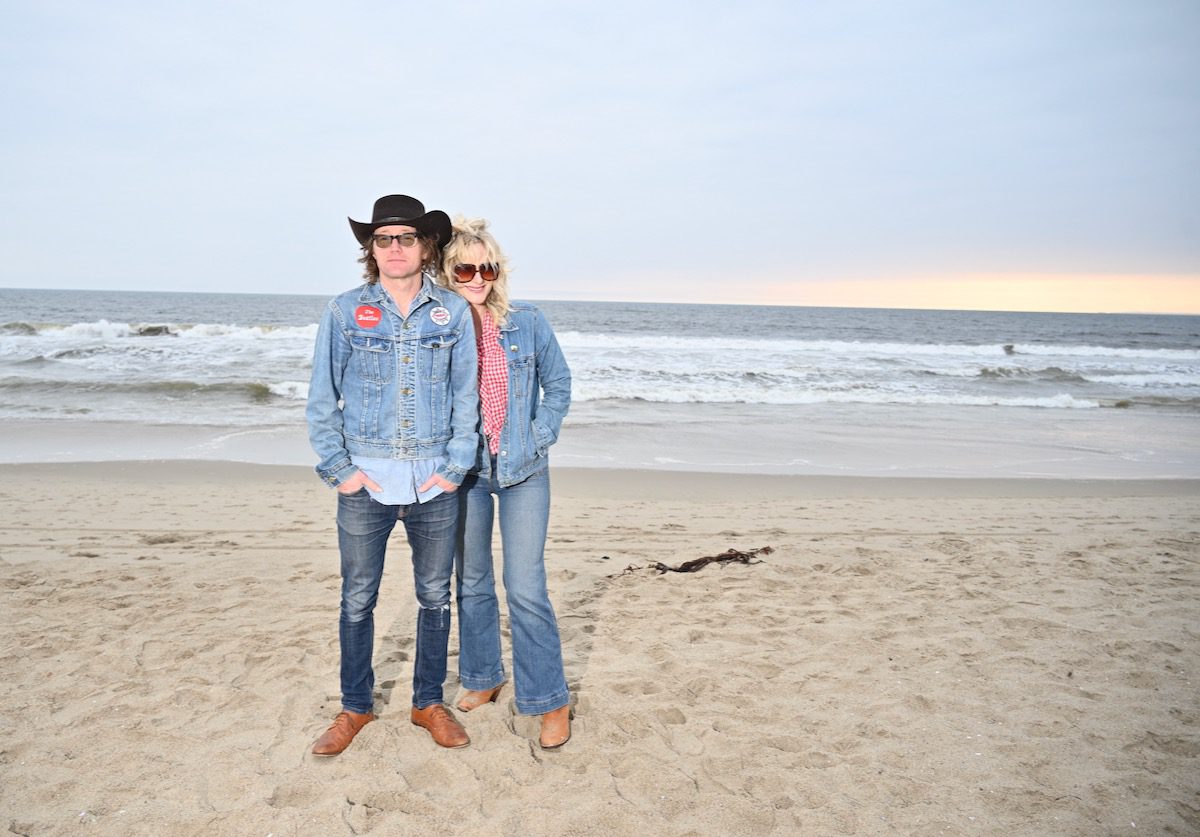In the Deep End With … Whitehorse

Luke Doucet and Melissa McClelland of Whitehorse (photo by Lyle Bell)
When you know as much about music as Canadian duo Whitehorse does, flavors from across time and genres are bound to seep into the sound.
Previously, musical and life partners Melissa McClelland and Luke Doucet have dwelled for a time in blues rock, folk, pop, and psychedelic country, but on their eighth full-length album, I’m Not Crying, You’re Crying, they make classic country sounds their home, the sadder the better. Within that retro lens, they explore some very contemporary issues — the pandemic, isolation, and, on a song called “Scared of Each Other,” the divide between fellow humans that seems to get wider every day. But some more timeless fare is covered too, namely heartbreak.
Opening song “If the Loneliness Don’t Kill Me” sets the tone, bringing pedal steel (played by Burke Carroll) to the album right from the get-go and letting listeners know they’re in for an emotional ride — finishing the song title’s phrase in the chorus, after all, is “… then the good times surely will.” It doesn’t get much more country than that.
“The Road,” “Six Feet Away,” and “I Miss the City” turn the mournfulness toward human connection, capturing the sorrow of the sudden loss of it during the pandemic. “I hope I never have to stand six feet away from you again / I hope I never have to wait six months before I hold your hand,” McClelland and Doucet sing, their voices twinned, then breaking into harmony, but quickly coming back together. “I hope there’s someone in your house, a proxy or a stand-in / A broomstick you can dance the night away with.”
But amid all the sorrow I’m Not Crying, You’re Crying, which comes out Jan. 13, is another essential element of classic country: humor. “Manitoba Bound” highlights how every family has its secrets and its quirks, but some are a little more far out than others. And on “Division 5,” a man visits the Royal Canadian Mounted Police to file a missing persons report for his lost love and ends up hearing just the country song he needs to hear instead.
We asked Whitehorse about sad songs, musical comfort zones, and tough advice (especially when it comes from the Mounties) for our In the Deep End With … series. Much like a good country weeper, the questions start out gentle but then go for the heart.
Are sad songs the best songs, and why is the answer yes?
Good songs are the best songs and they can come in any flavor, but sad songs are definitely the most satisfying to write. Pain is universal, and when you can squeeze yours out through a good melody and lyric, it’s irresistible to the rest of the world. Maybe it’s that we find more gravitas in sadness — or any negative emotions (fear, anger, regret) — so we mistake sad songs as more Serious. Or maybe it’s just that music is a simple art form that we ought to feel more about and think less about. Elvis Costello is often (erroneously?) credited with the quip “Writing about music is like dancing about architecture.” There’s something to that. Although, make no mistake, happy songs are way harder to write.
What are a few of your favorite country weepers (by other people) and what do you like about them?
Patsy Cline’s “She’s Got You” – Unfulfilled longing — the great-grandmother of which is unrequited love — has been the impetus for more songs than any other human experience. But it’s in country music generally and maybe with this song in particular that the pain of this experience is the most palpable. The sprinkling pianos, playful mid-tempo bass set against the hi-hats and the Jordanaires doo-wopping in the background … these production moves all create the illusion that we’re just enjoying an early ’60s pop country song. But of course Patsy Cline’s inimitably vulnerable croon “I’ve got your picture, the records, your class ring … but she’s got you” guarantees that tears salt your beers. Or maybe it’s just that this song has been the timeless soundtrack to so many broken hearts that it is synonymous with the egg in your throat that comes from the deepest nostalgia and regret.
Jason Isbell’s “Elephant” – This song has undoubtedly stopped many songwriters in their tracks. Most writers who attempt to imbue something horrible — dying with cancer — with the musical and lyrical gravitas it deserves end up failing by trying too hard, or caring too much. Too many minor chords. Too many dramatic pauses. Too much sincerity. Too much of whatever it is that distracts us from a good simple thing. Isbell uses humor and profanity — or the humor of profanity — and the candor of carnal instincts to break our hearts. It’s a deft move — maybe a master class in empathy without making your own feelings the star of the show. Not that sweeping up her hair isn’t devastating.
Daniel Romano’s “Middle Child” – Punk rockers make excellent country singers (Corb Lund!). Daniel Romano just steals your “Momma” (is anything more devastating than a mother leaving her boy?). And of course, in this story, his mom dies before he has a chance to ask her why she forsook him. Devastating.
Kathleen Edwards’ “Options Open” – I’m probably reading this wrong but it lands like a woman realizing she’s missed the boat; for what, it’s not clear: Companionship? Children? Unicorns and rainbows? Did she make “good” the enemy of “perfect”? In the punchline alone, she captures one of the great gambles of life: “For 39 years I’ve been keeping my options open.”

Yes, the songs on INCYC are rooted pretty firmly in the past — or at least the production is. Melissa’s voice and stories evoke early ’60s Patsy and Loretta. I’m a disciple of Lyle and Dwight, and that puts us deep into the ’80s, but we’re not naïve about the stamp the ’70s have left on this collection of songs. We lean hard on Gram and Emmylou. Their Beauty and Beast archetypes are instructive to us, with my frail warble and Melissa’s butter. And when Gram died, three months after my own birth, Emmylou found Nova Scotia-born producer Brian Ahern and they recorded a suite of perfect records together that spanned decades. Their teamwork (and marriage) provided a roadmap and some much-needed guardrails for us as a self-producing duo. After John Prine died of COVID in 2020, we immersed ourselves into the landscape of ’70s Americana as a tribute to him. My childhood homes in Halifax, Nova Scotia, and Winnipeg, Manitoba, were shrines to JJ Cale, Bob Dylan, The Band, Willie Nelson, and Emmylou. So surrendering to this era was like drinking coffee in my mother’s kitchen.
On INCYC, we didn’t overdub keys, fiddles, mandolins, percussion, or any fancy bells and whistles. We just built a record that sounds like a house band and two singers — all playing together in a room … like our band is (ideally). The legacy of Nashville and Texas in the ’70s made it easy for us.
Several of these songs capture the feelings of isolation and worry during the pandemic. Did a global plague and the lockdowns affect your approach to music making, and to life in general?
Our music has always had apocalyptic undertones, but the lockdown almost had the opposite effect. It’s like the world stopped spinning. We went from touring almost nonstop to pacing the halls in our home day in day out. But from silence comes music, and there was a rare introspection that informed our songwriting on this record. We fell into some nice routines and noticed details in our neighborhood that we never had time for before. Maybe our stories became more nuanced or maybe we just slept and dreamed more, but amid the dullness of our lockdown life some pretty vibrant colors emerged. Red, as in Burgundy, Barolo, Baby Duck (hey, we were on a COVID budget).
“Manitoba Bound” has a great chorus that goes “There’s a point at which I’m gonna make shit up / when the truth starts boring me to tears / But so far I just stick to simple facts / ’cause I ain’t had to make shit up in years.” How much of your songs are pulled from real life, and how much is fiction? Is there one (truth or fiction) that you like working from better?
“Manitoba Bound” wrestles with the fact that families all have dirt. The question is whether or not you rub it on your face to make it look like you’ve been fighting. When confronting the choice of airing someone else’s laundry or bullshitting, just do what makes a better song. That’s all anyone cares about. But you don’t have to show your hand. Nobody’s paying us enough for that.
Throughout your career, Whitehorse has visited several genres and eras from album to album. Where is your musical comfort zone, or do you have one?
The spirit of Whitehorse has always been to nudge each other out of our own comfort zones. You can take more risks as a band, I think. Something like jumping from a cliff while holding hands — like Thelma and Louise.
We both consume music the way most modern music lovers do — spanning genres and eras. So it only makes sense (to us) that we would want to express this in our writing and in the studio. It’s also just too tempting to not experiment during the production of a record and dress our songs up in something fancy. We’re a marketer’s worst nightmare, but it would get boring to do the same thing over and over. Most artists occasionally pretend to be of a different time and place — usually between takes in the studio while the drummer’s smoking a joint* — and then the band falls into whatever joke is being made: “Hey, lookit us, we’re the Bee Gees” or whatever. But that’s not what we’re doing. We’re not lampooning country music when we play our songs the way we do. We’re continuing the journey to pay respects and to learn midcentury American folk art. And it never ends. It’s also not easy. Most people who think it is can’t do it. Hell, most “country” artists can’t.
* Our drummer doesn’t like joints.
“Division 5” is a delightful hurtin’ song about asking the Mounties for help recovering a love who’s gone away, and getting some tough advice in return. What’s the best hardest advice you’ve ever gotten?
“Division 5” is about a confused drifter in the maudlin throes of self-pity and delusion. He tries to file a missing persons claim on his lost love and then, once surrounded by cops at the station, it becomes clear that he’s actually the one who’s lost — but only after one Mountie (Royal Canadian Mounted Police cop) turns out to be a country singer who sings it to our hero straight: You’re on your own (a hair more polite than Hayes Carll would put it, but we’re Canadians after all). It’s not the advice he was hoping for, but it never is. The hardest advice I’ve ever received was to shut my mouth. It’s been a long time since I’ve had much to say about much ever since, except maybe in private. Was it good advice? Jury’s out.




